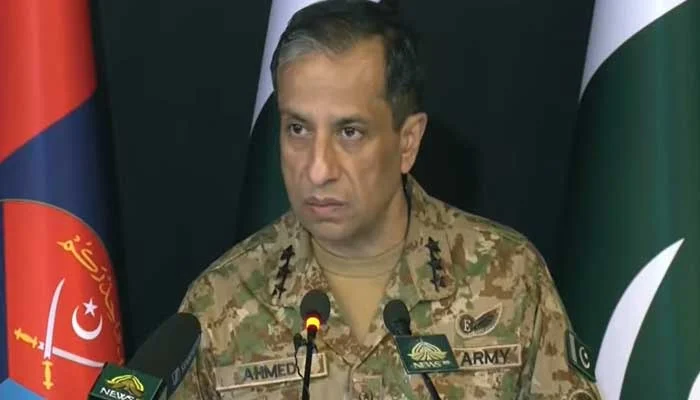A military clash between two nuclear-armed countries like Pakistan and India is nothing but “sheer stupidity.” This strong message came from DG ISPR, Lieutenant General Ahmed Sharif Chaudhry. He was speaking to a British media outlet following the latest standoff between the South Asian neighbors.
Chaudhry called the idea of a Pakistan-India nuclear conflict absurd and dangerous. He warned that a nuclear war would destroy both nations. “Pakistan wants peace,” he said, “but if war is imposed, we are fully prepared.”
The military spokesperson criticized India for promoting a narrative of war. He accused New Delhi of acting out of arrogance and creating unnecessary tension. “There is a real dispute between us,” he said. “It can flare up at any time.”
When asked about the possibility of a nuclear clash between the two sides, he said India was “playing with fire.” He added that such behavior was based on false stories and misleading claims.
Chaudhry made it clear that Pakistan has acted with great care and maturity. “We have avoided escalation,” he said. He dismissed Indian claims that Pakistan was involved in the Pahalgam attack. “If they give us proof, we’ll act,” he added.
He also criticized India for failing to ask tough questions within its own government. “No one is asking how their security failed,” Chaudhry pointed out. “No one is interested in the real reasons behind the attack.”
Regarding the ceasefire, he said Pakistan celebrates peace—not victory. “We do not want conflict,” he explained. “But if we are pushed into it, we will defend ourselves.”
When questioned about secret talks between the two countries, the military spokesperson kept his focus clear. “That’s for the Foreign Office,” he said. “The military doesn’t deal in politics or diplomacy.”
The DG ISPR also shared details of Pakistan’s response to Indian aggression. “We responded strongly on the night of May 6 and 7,” he said. “We shot down six Indian aircraft. We could have downed more.”
He announced the launch of a large-scale military response. The operation was called “Bunyan-um-Marsoos.” It targeted Indian military positions across several regions. These strikes followed unprovoked Indian attacks on Pakistani territory.
The retaliatory strikes were described as “precise and proportionate.” Pakistan said India had crossed the Line of Control (LoC) and attacked without cause. New Delhi claimed the targets were “terrorist camps,” but Pakistan rejected this.
During Operation Bunyan-um-Marsoos, Pakistan downed three Rafale fighter jets and dozens of Indian drones. After nearly four days of conflict, the Pakistan-India nuclear conflict came to an end. The United States brokered a ceasefire on May 10.
The standoff began after an attack in Indian Illegally Occupied Jammu and Kashmir (IIOJK). That attack killed 26 tourists. India blamed Pakistan but provided no proof.
The Pakistan-India nuclear standoff once again highlighted the risks of unchecked hostility in South Asia. Pakistan’s military leadership has called for calm. But they have also made it clear: any aggression will meet a strong and swift response.


